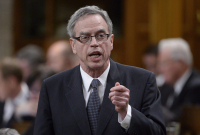Doug Ford and his caucus forgot to mention something when they filled up their gas tanks last weekend

Ontario's leaders were at the pumps all weekend reminding residents that the federal carbon tax was kicking in Monday.
From Kenora to Oxford to Ottawa and Toronto, all 55 members of the Progressive Conservative provincial government of Doug Ford posted photographs of themselves at gas stations warning drivers to fill up their tanks before a federal price on pollution adds to the cost.
The question of what to do about climate change was also largely avoided; none of the tweets even mentioned the phrase “climate change” or addressed the cost of failing to adequately address the problem.
Asked about it later at a news conference — held to herald the end of the province's Drive Clean program, an automotive emission control test — Premier Ford said he doesn't believe Ottawa will follow through on something that has been written into federal legislation and regulation and is written into tax forms.
"Nobody trusts the federal government when they cross their fingers and they say they will eventually, eventually, that's a magical word, give money back to us," he said. "I've yet to see governments give money back."
The federal carbon tax took hold in Ontario after the Progressive Conservatives cancelled the province's cap-and-trade program with Quebec and California after taking power last year. The federal government also imposed the tax in Manitoba, Saskatchewan and New Brunswick after those provinces opted not to impose their own pricing schemes on carbon emissions.
Residents of these four provinces will be getting rebates on their income tax returns that start at $128 annually and increase over the years. According to the federal government, an average Ontario household would pay $244 more a year on gasoline, natural gas, and home heating oil, but receive $300 in rebates.
Pricing carbon pollution is a central component of the federal government’s climate change plan, which they say is “widely recognized as an efficient way to reduce GHG emissions and help achieve our objectives to protect the environment, stimulate investments in low-carbon innovation and create a sustainable clean-growth economy.”
Ford's government is fighting the federal law in court later this month, arguing that it is unconstitutional.
While the Ford government flooded social media with photos of themselves at gas stations Sunday, reminding residents that gas prices would increase by 4.4 cents per litre, Green Leader Mike Schreiner responded by posting a video of himself charging his electric vehicle for free outside a grocery store in Guelph.
"It’s time for Ford to stop sabotaging climate solutions, and it's time to get real about helping drivers save money by converting to electric vehicles," he said in the video.
At Queen's Park, opposition MPPs like Schreiner were livid at the apparent public relations stunt against the federal carbon tax. NDP leader Andrea Horwath said "this was Mr. Ford's choice to bring the carbon tax to Ontario," in reference to the government's decision to axe existing climate policies.
Along with tearing down cap and trade, the Ford government has also:
- Repealed the Green Energy Act, which helped bolster the renewable electricity industry
- Cut electric vehicle subsidies
- Eliminated Drive Clean vehicle testing
- Closed down the GreenON program of rebates for residents who take energy-saving measures
- Axed the Environmental Commissioner of Ontario
Liberal interim leader John Fraser said Ford and his caucus "believe that there doesn't need to be a price on carbon, except the rest of the world knows there should be."
"The government is going in the wrong direction on this," Fraser told reporters. "There are more important things we should be focusing on than waging war against another level of government."
While Ford campaigned on scrapping cap and trade, Schreiner said the premier did not tell voters he would be "wasting their tax dollars sabotaging climate solutions. He didn't tell a single voter he'd spend millions of dollars fighting the federal carbon backstop in court."
"This premier is the most anti-environmental premier in Ontario in many generations," he said.
A tax that does 'absolutely nothing' for the environment, Ford says, despite evidence
The premier said that "the line-ups were endless" at gas stations across the greater Toronto area on Sunday night, while equating molecular chemistry with targeted policy to offset pollution. "Every single person in this country, everything is made of carbon, everything is going up," Ford said.
While that statement may be partly true (the element is common to all known life forms, and is the second most abundant element in the human body after oxygen), the price only applies to materials that are burned or otherwise used in a way that releases carbon dioxide and other emissions known to increase global warming.
"No matter if it's your food, your clothes, driving little Johnny to hockey, everything is going up," he said. He also referred to the risk of a "carbon tax recession," a claim that economists do not back up.
"You can be for a carbon tax or you can be for jobs, but you can't be for both," he said.
He cited data showing that Ontario had already reduced its greenhouse gas emissions by 22 per cent compared to 2005 levels, without mentioning that most of that was due to the phase-out of coal-fired power plants under previous Liberal provincial governments.
Ford's government has agreed to reduce emissions by 30 per cent below 2005 levels by 2030, proportionate to Canada's overall commitment in the Paris Accord, a global agreement from which the United States has withdrawn under President Donald Trump.
Asked how his government can argue that a price on pollution doesn't help fight climate change, Ford deferred to his environment minister, Rod Phillips.
"We know that there are a number of tactics, a number of approaches, that reduce greenhouse gases," Phillips said, acknowledging that the elimination of coal as a source of electricity between 2003 and 2014 was the single biggest contributor.
Phillips said the Ford government's measures to reach its goal include looking to increase the amount of ethanol in fuel, spending $400 million over four years through the Carbon Trust to encourage business to reduce emissions, and emissions standards for large diesel vehicles.
"The idea that we turn commuters into polluters in the mind of the federal government is punishing people who don't have another choice, they have to drive to work, they have to drive to pick up their kids, they have to to use their vehicles, they have to heat their homes, this is Canada," he said.
An EcoFiscal report released last month cited evidence busting 10 myths about carbon pricing, including that it is an untested idea that will cost Canadian families and hurt jobs.
"Opponents of carbon pricing should debate carbon pricing based on the evidence," the report said. "Canadians should have a thorough and honest discussion. Relying on myths or poor information is harmful not only to the debate over carbon pricing, but also to our broader public discourse. We can do better."
Referring to a calculation that the carbon price will cost the average Canadian household $648 a year by 2022, Ford said "that may not seem a lot of money for the lobbyists or activists or economists who designed the carbon tax for the federal Liberals. But it sure is a lot of money to the seniors, the truckers, the waitresses, the hardworking people I meet everywhere I go across this province."
"It's a tax, with the word carbon in front of it," he said. The federal government calls it a price on pollution rather than a carbon tax.
"It does nothing for the environment, absolutely nothing," he added, despite evidence showing that imposing a price tends to change negative behaviour, such as releasing emissions that worsen climate change or cigarette smoking that leads to lung disease.
Last week, Dianne Saxe — whose tenure as Ontario’s environmental commissioner ended Monday after Ford eliminated her position along with two other watchdogs — warned that the state of climate policy in the province is “frightening.”
“At a time when climate damage is accelerating, Ontario is turning away from the things that we know work,” she said.
We asked all 55 Tories who tweeted about the carbon tax this weekend why they didn't mention the rebates, climate change
National Observer asked all 55 Progressive Conservative members about their tweets Monday and posed the following questions:
- The tweet failed to mention the federal rebates, which will exceed the carbon tax for Ontario residents. Could you please explain why.
- The tweet also failed to mention climate change. Do you believe that the carbon tax will help fight climate change? If not, what climate policy do you believe would be more effective? Additionally, do you believe climate change is a problem that needs to be addressed by government policy?
- Do you agree that the carbon tax was implemented in Ontario after the government cancelled the cap and trade system?
We received no responses, except one from the premier's spokesperson Simon Jeffries who repeated the premier's message, including that "Climate change is a real and credible threat; but the people understand that you don’t need a carbon tax to fight climate change."
"The people of Ontario also know better than to trust a politician who says they are going to save you money by increasing your taxes – especially in the middle of an election year. Using even the most conservative estimates, the Federal Government’s rebate will not alleviate the increased costs families and job-creators will feel with the federal carbon tax," Jeffries wrote.







Comments
These Ontario Conservatives are so ignorant. What is it that they don't understand. That we want to live in a healthy environment? That we don't give a shit about profit and growth? That the TTC and Toronto councillors do a good job for the GTA citizens? Everything Doug does costs us more money. Ford is not a leader, he is a criminal, fraud, manipulator, extortionist.
If governments of all levels want to show good faith and serious intent to meet carbon emission reductions they can:
Mandate the rebates on annual license plate fees for all electric or hybrid electric vehicles on a sliding scale of 100% for all electric and 60% for hybrids.
Encourage the purchase of all electric vehicles by foregoing all sales tax revenue from those sales, and a 50% reduction in sales tax for hybrids.
Require all purveyors of fossil fuels to incorporate electric vehicle charging stations in convenient locations in numbers that represent at least 25% of the vehicles they service annually - that percentage to rise in proportion to the numbers of electric vehicles registered in their jurisdiction.
Require all toll road, bridge, tunnel operations to offer free or substantial reductions to vehicles identified as "green" (I.E. electric or hydrogen fueled.) Identification can be facilitated through the transponder system or by a machine readable bar code on the vehicle.
Require all residential and commercial developers to implement carbon neutrality in their buildings.
Reward tree planting on provincial/leased forestry lands by reducing the royalties and/or taxes paid by the corporations harvesting trees, with suitable proof of compliance, of course.
None of the foregoing require outlay of tax monies - merely the reduction in vehicle based or forestry royalty. revenue streams and changes to the provincial building standards/codes to enforce carbon neutrality.
No doubt these or similar ideas have been floated, and rejected by almost all the provincial jurisdictions. I wonder what level of pain they will have to endure before they start to exercise their collective brains.
Most likely decisive defeat at the polls would be the most salutary!